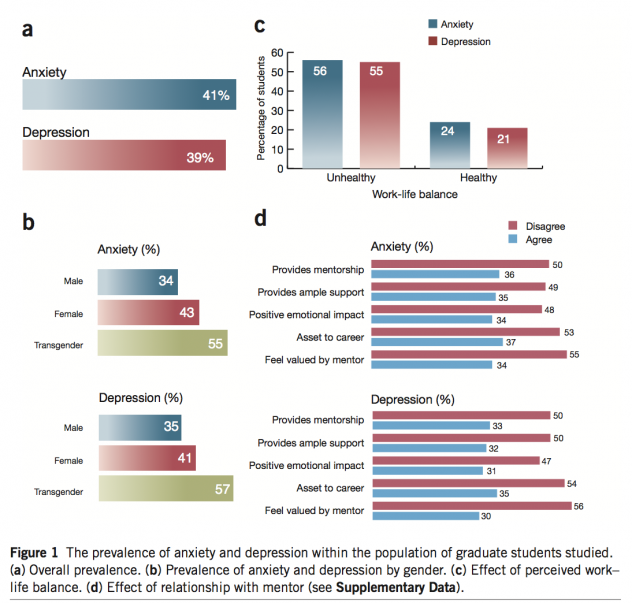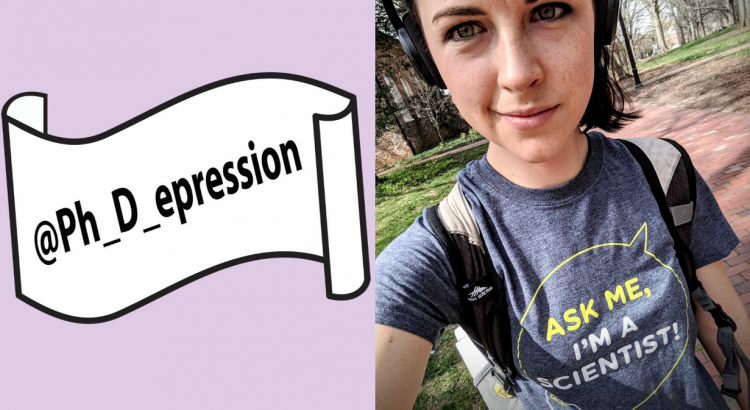Podcast: Play in new window | Download
Subscribe: Spotify | Email | TuneIn | RSS
Susanna was experiencing insomnia that began to interfere with her work and life. She visited the campus health clinic, and they referred her to mental health resources on campus.
There, the doctor recommended medication for depression and anxiety, and therapy to work through the issues that were interfering with her sleep.
“We’re actually really worried that you’re severely depressed,” the doctor explained. Susanna’s reply: “No, I’m just in grad school!”
There’s no question that graduate training is stressful. Rotations, qualifying exams, committee meetings, and the constant struggle to make experiments work can push every student toward the boiling point.
But lurking under Susanna’s protest is a dangerous assumption many of us share. We believe that anxiety, depression, sleeplessness and other symptoms of mental illness are a required and normal side effect of graduate training.
And we’re not wrong. A recent study published in Nature Biotechnology (summary here) found roughly 40% of graduate trainees measured in the ‘moderate to severe’ range for depression and anxiety. The authors surveyed over 2,200 trainees in 26 countries, in fields ranging from the humanities to the biological and physical sciences.

In contrast, moderate-to-severe depression affects just 6% of the general population when measured with the same inventory.
“Our results show that graduate students are more than six times as likely to experience depression and anxiety as compared to the general population,” the study says.
These alarming numbers reveal a latent mental health crisis brewing in our classrooms, labs and libraries. But what can we do about it?
Searching for Solutions
The study’s authors highlight the fact that poor work-life balance was a contributor to student mental illness. They also noted breakdowns in the mentor-trainee relationship that exacerbated the issue. Finally, they highlight the uniquely challenging circumstances of transgender students, gender non-conforming students and women, who are “significantly more likely to experience anxiety and depression than their male graduate student counterparts.”
They suggest a menu of changes to graduate training, including increasing access to mental health resources, training mentors, and modifying the culture of research to improve work-life balance.
But those solutions will likely take years to understand and implement. What’s to be done for students who are suffering today?
Susanna Harris had read the statistics, and she knew there must be other scientists around her that wrestled with the same feelings she had, but where were they? “You can’t see mental illness on somebody – it’s not a stock photo of a girl wiping away tears,” she notes.
So she decided she’d go first – to tell her story in a public way so that others who were also struggling could find comfort, acceptance, and inspiration for their own journeys.
She launched a social media community on Instagram under the handle @Ph_D_epression. Students and scientists post an image of themselves, along with a personal story describing their experience with mental health.
“Our goal is that PhDs and students feel comfortable discussing and seeking help for mental and emotional health in the same way as they do for maintaining physical health. We want to disrupt the cycle of secrecy and shame through sharing and discussing personal struggles with mental health issues.”
As contributors share their stories, they receive back a flood of comments offering support, encouragement, and thanks.
“Love you for this honesty!! You are awesome!” wrote one commenter. “Thanks for sharing your story 💕I’m sure your testimonial will help many people. The stigma has to end, too many people suffer in silence and unnecessarily,” added another.
The community has expanded to Twitter and Facebook as well. Find them at https://www.instagram.com/ph_d_epression/, https://twitter.com/Ph_D_epression, and https://www.facebook.com/thephdepression/ where they encourage you to share your own journey. “We’re looking for people to connect and to support people, and this project is about decreasing stigma and increasing conversation. So if you know anyone who has been vocal about their own struggles, we are always looking for more stories.”
“You don’t have to wait for a breakdown to take care of yourself,” Susanna concluded. “You’re absolutely not alone. It doesn’t have to be this hard… Get the help or support you need!”
Team Laurel
As the “Laurel or Yanni” wildfire slowly burned itself out, we found the last person on earth who hadn’t heard the sound file: Josh! We manage to recreate the illusion, and explain the science behind the magic behind the nonsense. Hear both versions on the New York Times interactive website.
For ethanol, we share the Dragon’s Milk Bourbon Barrel Aged Stout from New Holland Brewing in Michigan. It’s a dark and heavy brew to slowly sip from your fanciest glass. Just don’t ask us where dragon’s milk comes from…

One thought to “093: The Grad School Mental Health Crisis, and What You Can Do About It”